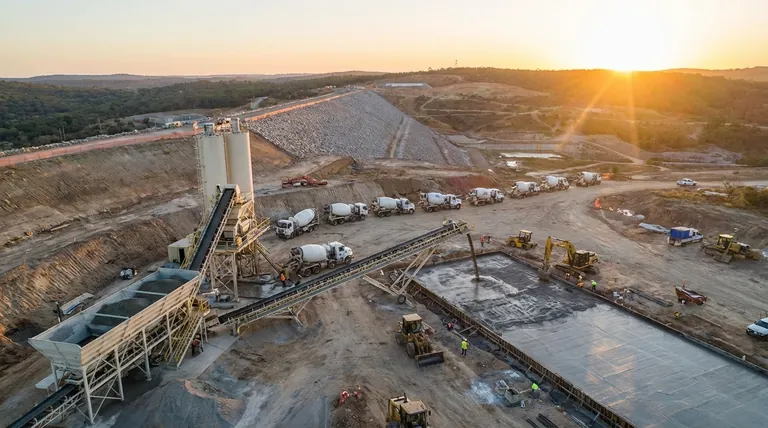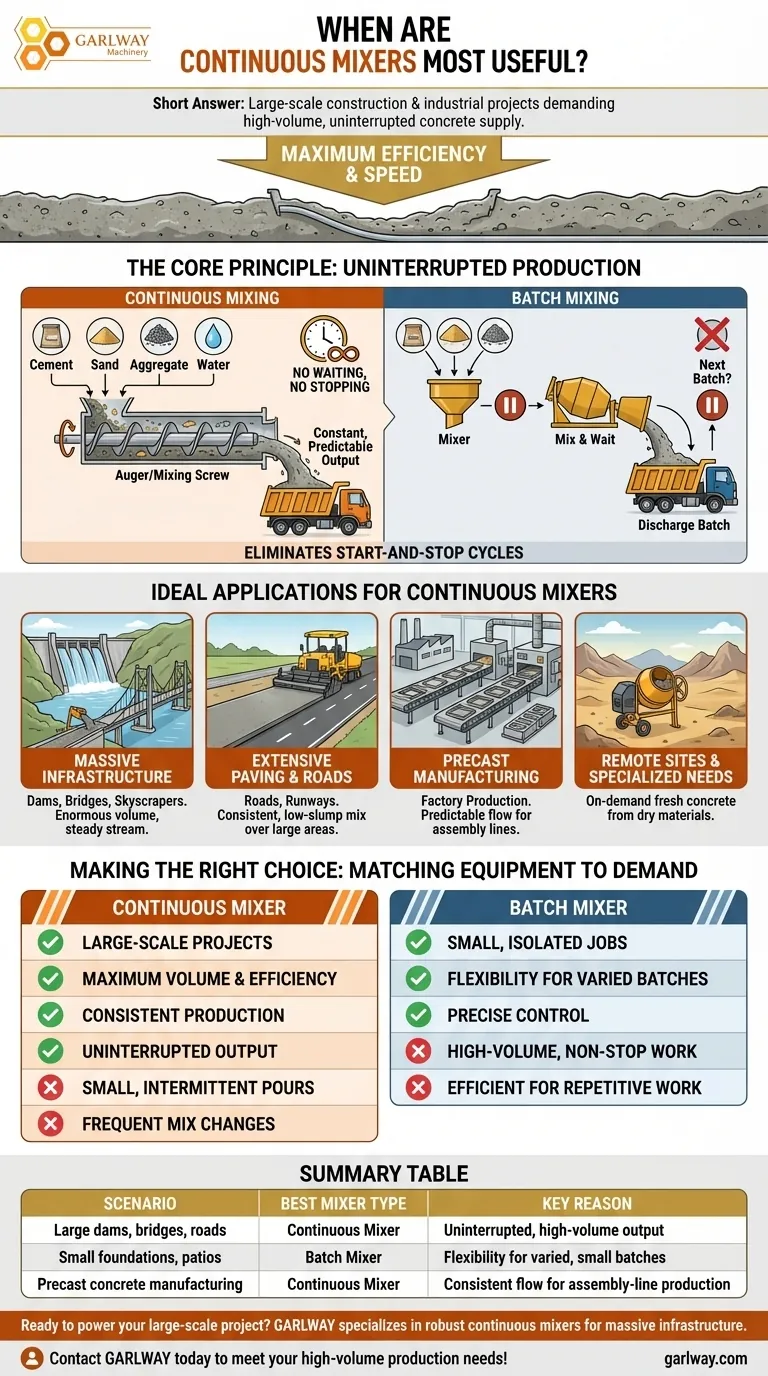In short, a continuous mixer is most useful for large-scale construction and industrial projects that demand a high-volume, uninterrupted supply of concrete. Their design excels in situations where stopping the flow of concrete would cause significant delays and inefficiencies, such as in the construction of massive infrastructure like dams, bridges, and extensive road systems.
The core decision to use a continuous mixer comes down to project scale. It is a tool designed for massive, non-stop operations where its primary advantage—an unbroken stream of concrete—translates directly into maximum efficiency and speed.

The Core Principle: Uninterrupted Production
To understand when a continuous mixer is the right choice, you first need to understand its fundamental operational advantage over a traditional batch mixer.
How Continuous Mixing Works
A continuous mixer does not work in separate, distinct batches. Instead, raw materials like cement, sand, aggregate, and water are continuously fed into the machine.
An auger or mixing screw then propels these materials through a chamber, mixing them thoroughly along the way.
The machine is designed to discharge freshly mixed concrete at the same rate the materials are loaded, creating a constant, predictable output.
The Key Advantage: A Constant, Steady Flow
This process eliminates the start-and-stop cycle inherent in batch mixing. There is no waiting for one batch to finish before the next one can begin.
This uninterrupted flow is the single most important characteristic of a continuous mixer, making it a powerhouse of productivity for the right kind of job.
Ideal Applications for Continuous Mixers
The efficiency of continuous production makes these mixers the standard choice for specific, demanding project types.
Massive Infrastructure Projects
For projects like dams, large bridges, and skyscrapers, the sheer volume of concrete required is immense. A continuous mixer provides the steady, high-volume stream needed to complete enormous pours without interruption.
Extensive Paving and Road Construction
Paving roads or runways requires a consistent, low-slump concrete mix delivered over a large area. A continuous mixer can keep pace with paving equipment, ensuring a seamless and efficient operation.
Precast Concrete Manufacturing
In a factory setting, precast concrete producers rely on predictable, consistent production to fill molds efficiently. Continuous mixers integrate perfectly into this assembly-line-style workflow.
Remote Sites and Specialized Needs
For remote construction sites, a continuous mixer can be highly practical. It allows for the production of fresh concrete on-demand, using dry materials that are easier to transport and store than ready-mix.
Understanding the Trade-offs
While powerful, a continuous mixer is not a universal solution. Its strengths in high-volume scenarios become limitations in others.
Less Suited for Small, Intermittent Pours
The setup, calibration, and cleaning process for a continuous mixer makes it inefficient for small, isolated jobs. A traditional batch mixer is far more practical for tasks like pouring a small foundation or patio.
Potential Challenges with Mix Variability
These machines are optimized for producing one consistent mix design for a prolonged period. They are not ideal for projects that require frequent changes between different concrete recipes or small, highly specialized batches.
Making the Right Choice for Your Project
Selecting the right mixer is about matching the equipment's core strength to your project's primary demand.
- If your primary focus is maximum volume and efficiency for a large-scale project: The uninterrupted output of a continuous mixer is the definitive choice.
- If your primary focus is flexibility for multiple small or custom batches: A batch mixer provides the control and practicality needed for smaller, varied pours.
- If your primary focus is consistent production in a manufacturing or paving environment: A continuous mixer is designed specifically for this type of high-throughput, repetitive work.
Ultimately, choosing a continuous mixer is a commitment to large-scale, non-stop production.
Summary Table:
| Scenario | Best Mixer Type | Key Reason |
|---|---|---|
| Large dams, bridges, roads | Continuous Mixer | Uninterrupted, high-volume output |
| Small foundations, patios | Batch Mixer | Flexibility for varied, small batches |
| Precast concrete manufacturing | Continuous Mixer | Consistent flow for assembly-line production |
Ready to power your large-scale project with a reliable concrete supply?
GARLWAY specializes in construction machinery, offering robust continuous mixers and batching plants designed for construction companies and contractors working on massive infrastructure. Our solutions ensure maximum efficiency, reduced downtime, and consistent quality for projects like dams, paving, and precast manufacturing.
Contact GARLWAY today to discuss how our equipment can meet your high-volume production needs!
Visual Guide

Related Products
- Ready Mixer Machine for Construction Ready Mix Machinery
- Portable Ready Mix Concrete Mixer Equipment
- Auto Concrete Cement Mixer Machine New
- Construction Products Concrete Plant Machine Mixing Concrete Mixer
- HZS90 Large Multiquip Concrete Mixers for Construction
People Also Ask
- What was significant about Roscoe Lee's 1934 concrete mixer design? Pioneering Modular Construction Equipment
- What is the average lifespan of a concrete mixer? Maximize Your Equipment's Lifespan & ROI
- Which type of projects require a concrete mixer? Essential Guide for Construction Pros
- Can a concrete mixer be used for mortar? Understanding the trade-offs for your project
- When was the first concrete mixer developed and by whom? Discover the 1900 Breakthrough



















